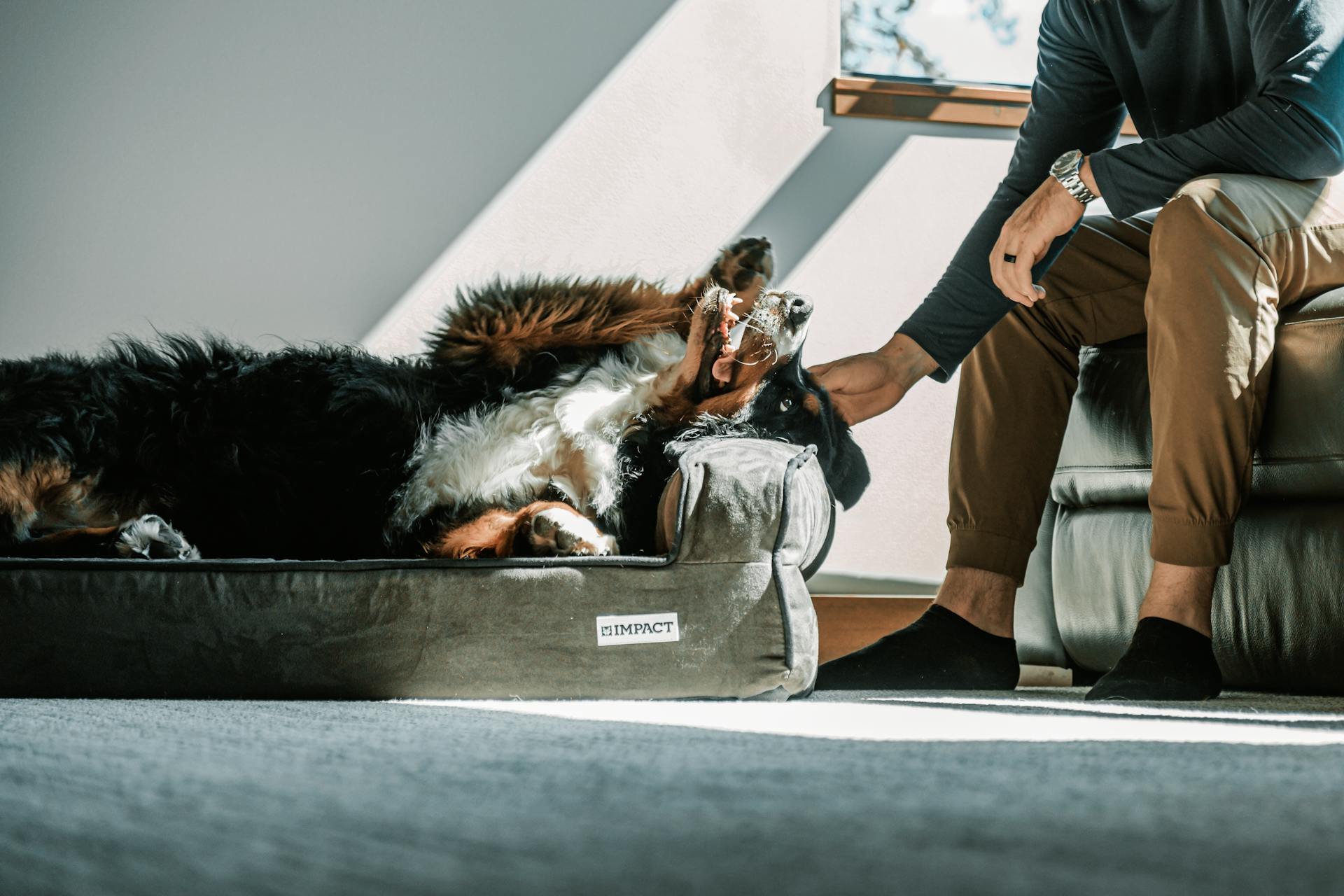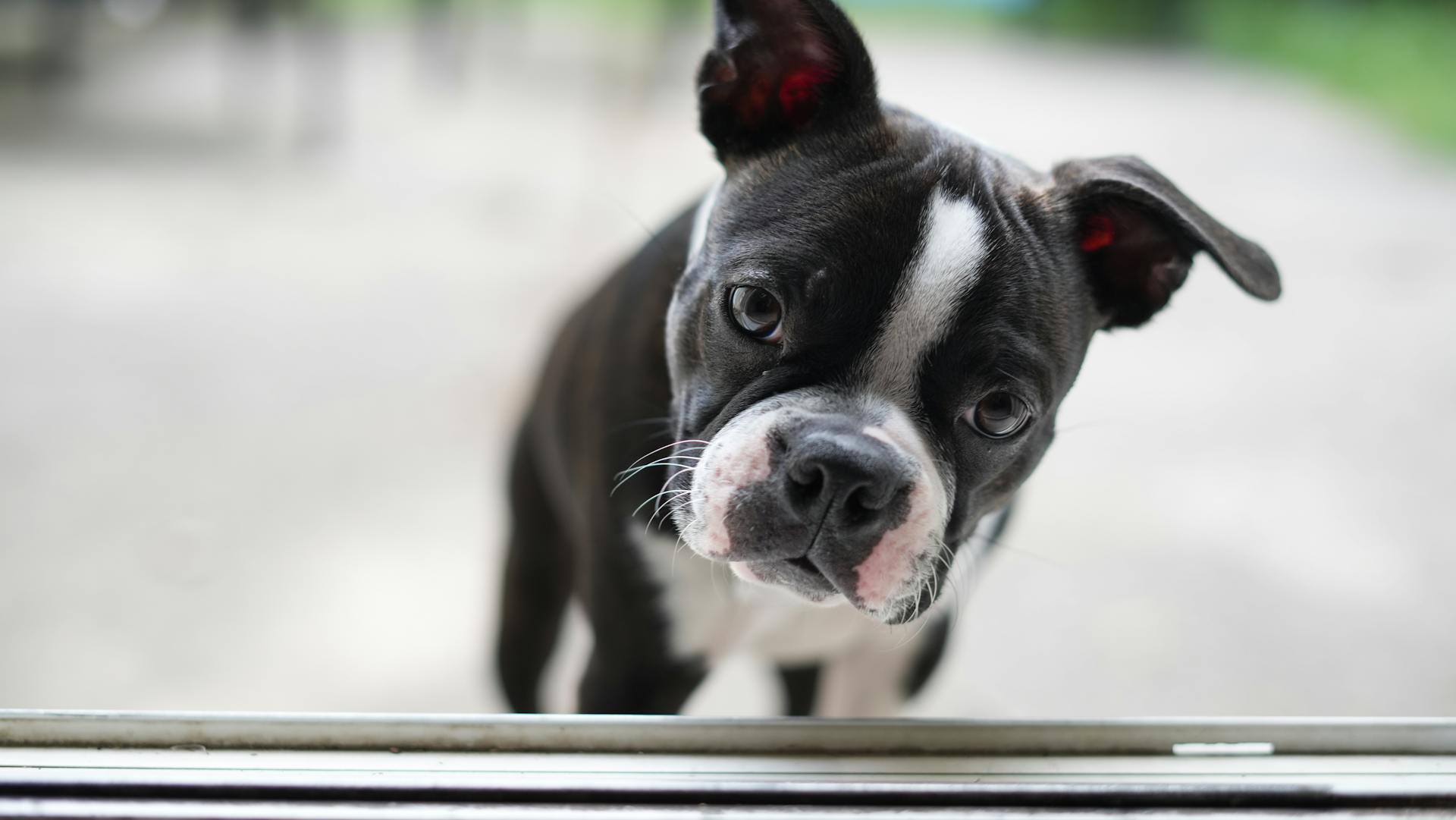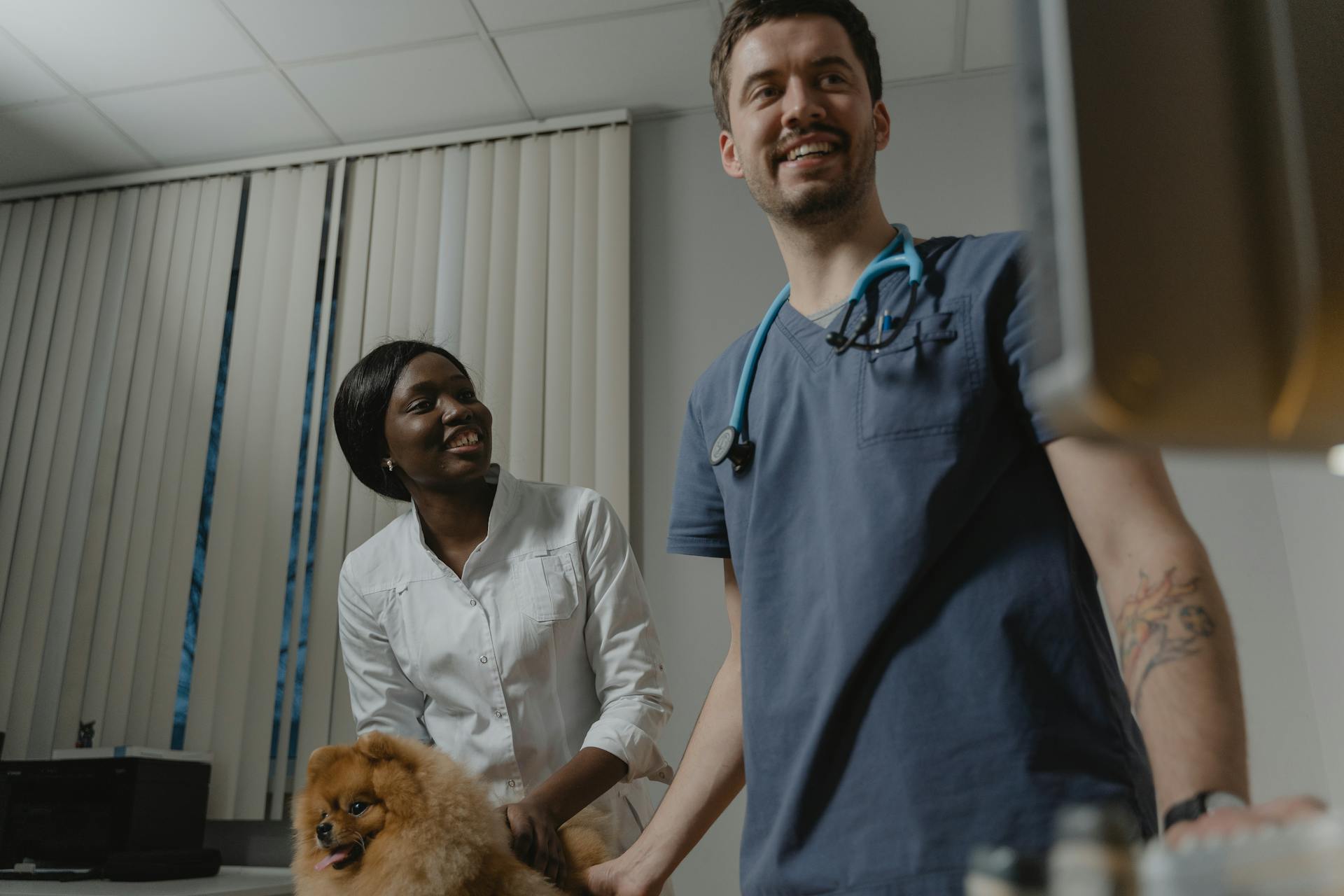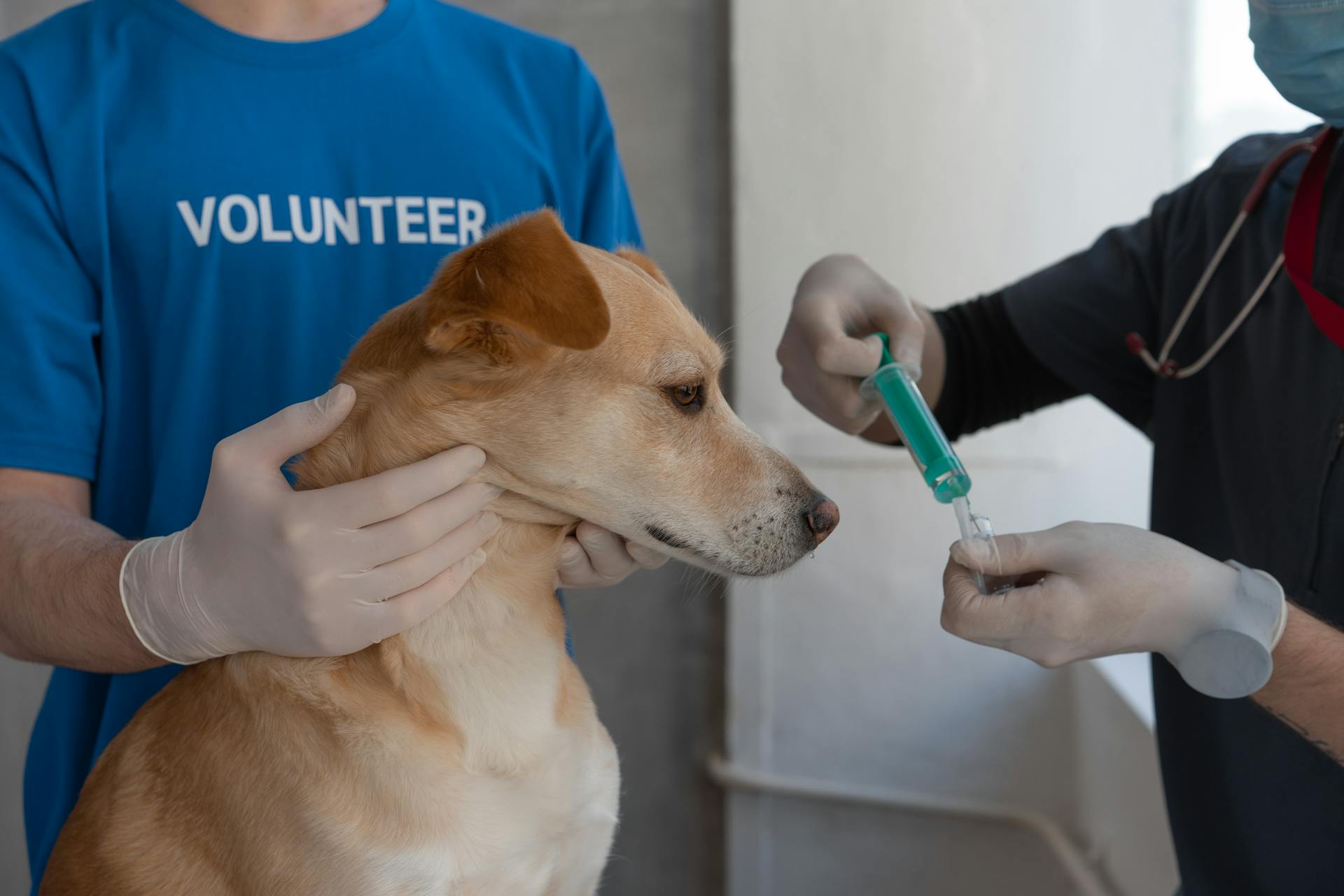
Dog diarrhea can be a real pain for both you and your furry friend. According to our article, the most common causes of dog diarrhea are bacterial infections, viral infections, and dietary indiscretions.
If your dog is experiencing diarrhea, you'll likely notice loose, watery stools, and possibly even vomiting. The frequency and consistency of diarrhea can vary, but it's often accompanied by abdominal pain and straining during bowel movements.
One of the most important things to do if your dog has diarrhea is to withhold food for 12-24 hours to give their stomach a chance to recover. This can help prevent dehydration and give their system a break.
A unique perspective: Dandelions Give Dogs Diarrhea
What Is Dog Diarrhea?
Dog diarrhea is a common issue in dogs, and it's not a disease itself, but rather a symptom of many different diseases.
Diarrhea is defined as passing loose or liquid stools in large amounts or more often than usual.
Your veterinarian needs to find the underlying cause of your dog's diarrhea to figure out the prognosis and the right treatment plan.
Diarrhea can be caused by eating something abnormal, which is a common reason for loose stool in dogs.
A viral disease or toxin is a more concerning reason for dog diarrhea, and it requires immediate attention from a veterinarian.
No matter why your dog has diarrhea, it's essential to know how to stop the condition and whether to rush them to the vet or keep an eye on their condition at home.
Causes and Risk Factors
Dog diarrhea can be caused by many issues, including eating trash or foods meant for people, which is known as dietary indiscretion. This can lead to a dog developing diarrhea.
Some common causes of dog diarrhea include eating what they shouldn't, whether it's too much food or spoiled food, changes in diet, food intolerance or allergies. In addition, parasites such as roundworms, hookworms, and whipworms can also cause diarrhea.
Other factors that can contribute to dog diarrhea include bacterial infections like Salmonella, viral infections like Parvovirus, and stress-related issues. These can be life-threatening problems, so it's essential to consult with a veterinarian if your dog's diarrhea persists.
Here are some common causes of dog diarrhea:
- Dietary indiscretion
- Toxin ingestion
- Foreign body ingestion
- Switching foods
- Internal parasites
- Infection
- Allergies
- Cancer
- Inflammation (swelling)
- Pancreatitis
- Medication
- Organ dysfunction
- Stress
Causes and Risk Factors
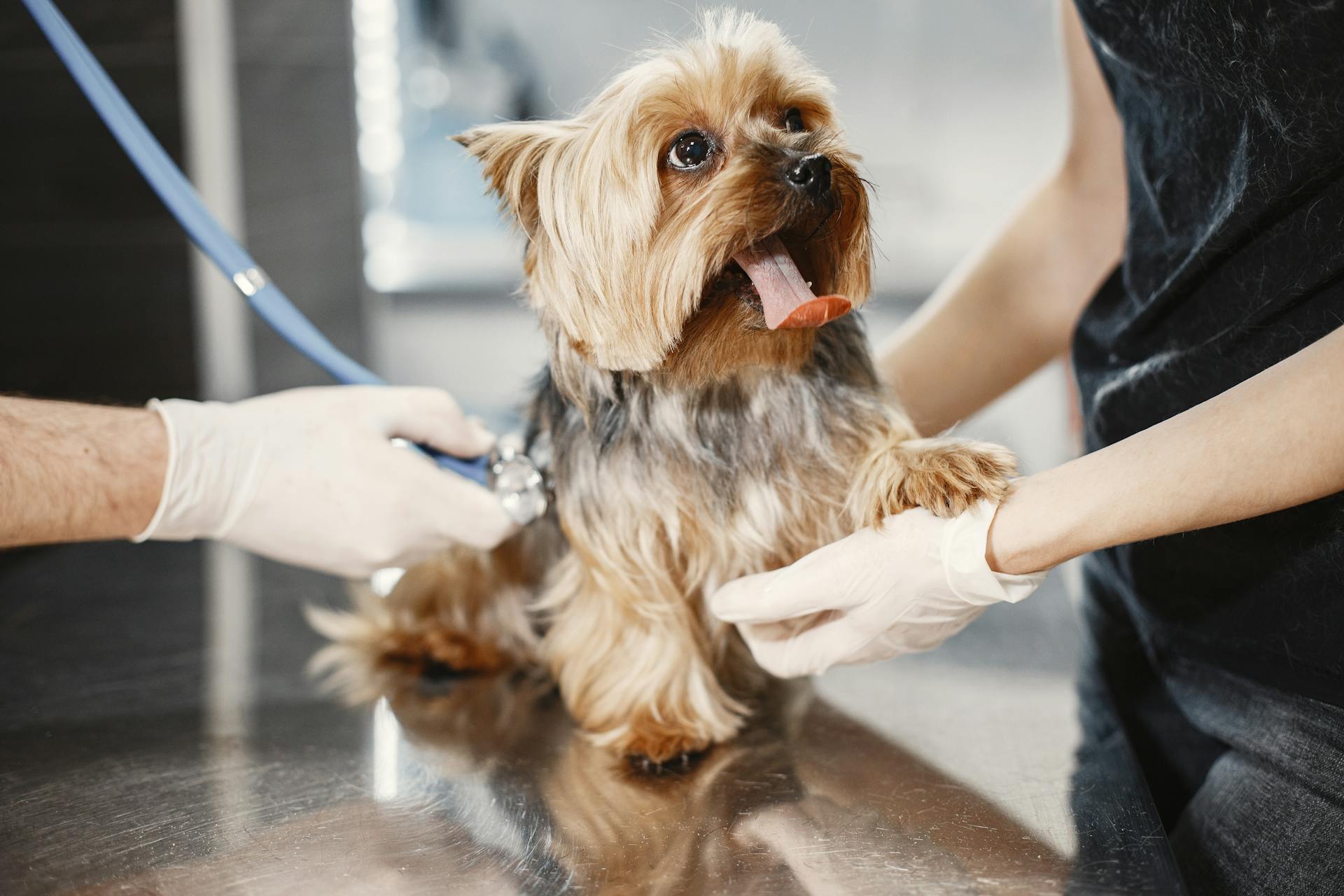
Dogs can develop diarrhea due to a variety of reasons, including eating spoiled food, changes in diet, and food intolerance or allergies.
Eating too much grass can be a common cause of diarrhea in dogs. Some dogs really enjoy grazing on grass, but it can still cause loose stools or diarrhea.
Intestinal parasites, such as hookworms, tapeworms, giardia, and roundworms, can cause diarrhea in dogs.
Bacterial infections, like Salmonella, and viral infections, like parvovirus, can also lead to diarrhea.
Stress and other medication can cause dog diarrhea. Change in schedule or diet can be things that cause dogs stress.
Some common causes of diarrhea in dogs include eating what they shouldn’t, whether it’s too much food or spoiled food, changes in diet, food intolerance or allergies.
Other factors can cause diarrhea in dogs, such as parasites, illnesses, stress, and medication.
Here are some potential causes of diarrhea in dogs:
- Inappropriate or sudden changes in your dog’s diet
- Intestinal parasites
- Bacterial infections
- Viral infections
- Stress-related
In some cases, diarrhea can be a sign of a more serious health issue, such as metabolic problems, gastrointestinal tract disease, or foreign objects stuck in the stomach or intestines.
Here are some less common yet serious causes of diarrhea in dogs:
- Hemorrhagic diarrhea (HGE)
- Boxer colitis
- Medication-related
- Fungal infections within the digestive tract
- Cancer
Are Certain Predisposed?
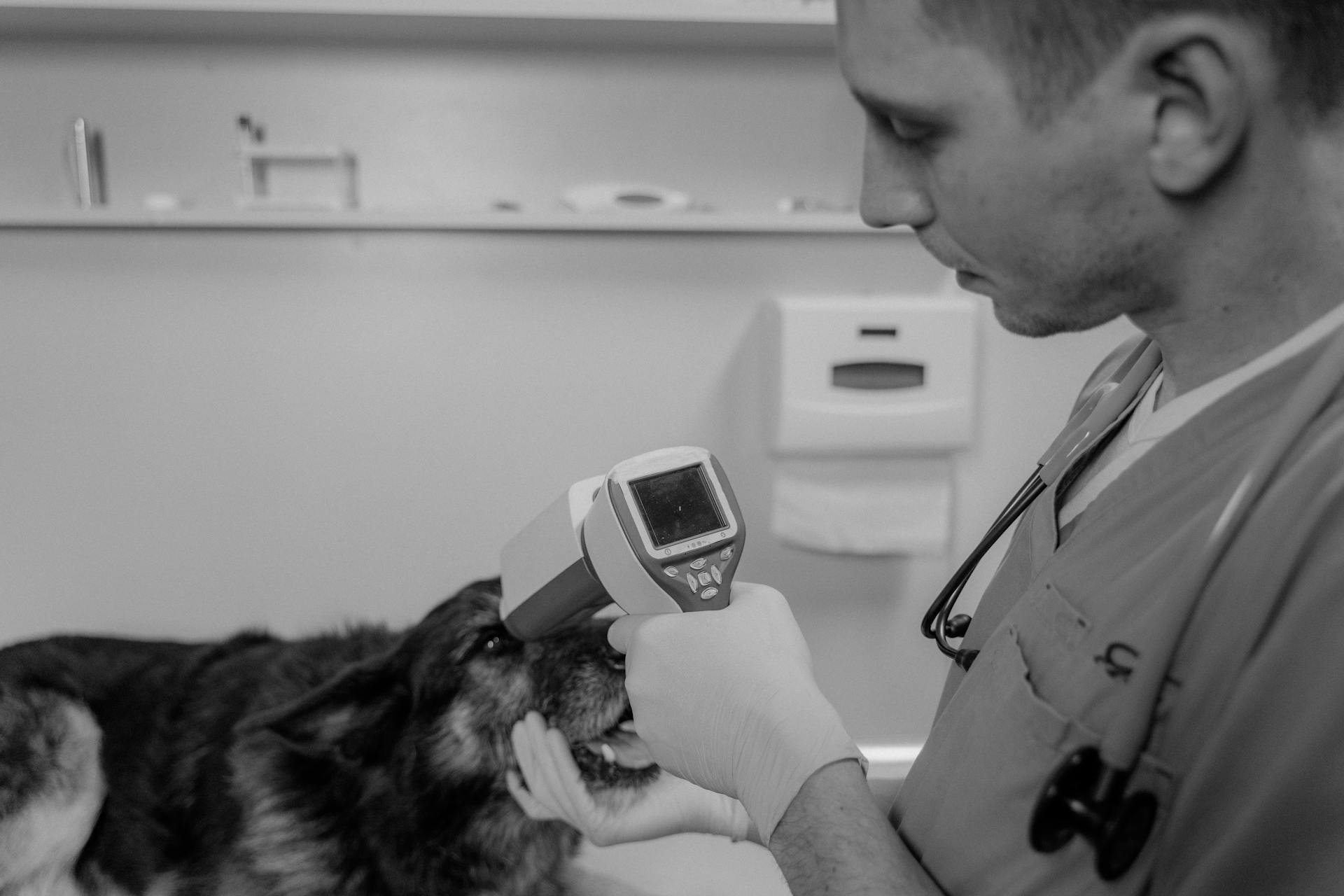
Some dogs are naturally more prone to experiencing diarrhea due to their breed or age.
Younger dogs and puppies are more likely to experience diarrhea due to parasites, stress, or diet changes during weaning.
Greyhounds are notorious for their delicate stomachs, which can lead to loose stools even with the slightest diet change or stress.
Labradors and Golden Retrievers may have more resilience in their tummies, but they still tend to get mild stomach upset from sneaking unhealthy treats.
Miniature Schnauzers, Yorkshire Terriers, and Shetland Sheepdogs are also breeds that are more likely to experience medical problems that cause diarrhea.
Chronic diarrhea in senior dogs can be a sign of a more serious issue, so it's essential to keep an eye on their health.
These breeds may require extra attention and care to prevent digestive issues and maintain a healthy gut.
On a similar theme: Dog Breeds Watch Dogs
Signs and Symptoms
Dog diarrhea can be a real challenge for pet owners, and it's essential to recognize the signs and symptoms to provide the best care for your furry friend.
If your dog is experiencing diarrhea, you might notice unformed, watery stool in their litter box or yard.
Loss of appetite is another common symptom, and if your dog is normally a foodie, it's a good idea to keep an eye on their eating habits.
Dehydration is a serious concern, so make sure to provide plenty of fresh water to help your dog stay hydrated.
Painful abdomen can be a sign that your dog is uncomfortable, so if you notice them whining or showing discomfort, it's a good idea to consult with a vet.
Here are some common symptoms of dog diarrhea:
- Loss of appetite
- Dehydration
- Painful abdomen
- Black or tarry stool
- Weight loss (with chronic diarrhea)
- Fever or hypothermia
Diagnosis and Treatment
Veterinarians diagnose the underlying cause of dog diarrhea through a detailed history, physical exam, blood work, fecal exam, and other diagnostic tests, such as X-rays and biopsies.
A thorough examination helps identify the root cause, whether it's a bacterial infection, food allergy, or intestinal parasite.
Treatment options vary depending on the underlying cause, but may include withholding food, fluid therapy, antibiotics, anti-parasitics, diet change, or monoclonal antibody treatment.
You might enjoy: Safest Dog Flea Treatment
Here are some common veterinary-prescribed treatments for diarrhea in dogs:
Veterinary Diagnosis
Veterinary diagnosis for dog diarrhea involves a thorough physical examination to check for abnormal signs, such as sticky gums, which can occur with dehydration.
Veterinarians will also ask about changes in the pet's behavior and any other concurrent symptoms. They may request a stool sample for analysis to identify the underlying cause of diarrhea.
Blood work can be done to assess the dog's overall health and identify any underlying or concurrent conditions. This can include a complete blood count (CBC) and biochemistry profile to check for issues like kidney and liver disease or infection.
A fecal exam can be helpful to find intestinal parasites. A parvo test may be recommended if the dog is a puppy or unvaccinated to rule out this potentially deadly viral disease.
In some cases, X-rays may be taken to examine the gastrointestinal tract closely, such as in the case of a potential foreign body blockage. An intestinal biopsy may be needed to diagnose the diarrhea's cause.
Here are the diagnostic methods veterinarians may use to diagnose dog diarrhea:
- History: taking a detailed history to figure out if the dog was exposed to anything that may have triggered their diarrhea
- Physical exam: a thorough nose-to-tail exam to check the dog’s overall health and find abnormalities
- Blood work: including a CBC and biochemistry profile to check for issues like kidney and liver disease or infection
- Fecal exam: to find intestinal parasites
- Parvo test: to rule out this potentially deadly viral disease
- X-rays: to examine the gastrointestinal tract closely
- Biopsy: to diagnose the diarrhea's cause
- Food elimination trial: to figure out the ingredient that is causing the problem if a food allergy is suspected
Vet-Prescribed Treatments
If your dog needs to see a veterinarian to have its diarrhea treated, prescription medications and special foods may be recommended. Your vet may prescribe antibiotics, such as Metronidazole (Flagyl) or Tylosin (Tylan), to treat infections and inflammation that result in diarrhea.
Depending on the underlying cause of the diarrhea, other medications and treatments may also be necessary. For example, Prednisone, a steroid, may be used to decrease inflammation in the gut, but it needs to be administered and monitored carefully due to its potential side effects.
A fecal analysis and diagnosis of a specific parasite may lead to the prescription of a dewormer to treat intestinal parasites. These dewormers can be purchased over the counter, but it's best to have your vet prescribe the appropriate one based on the diagnosis.
Your vet may also recommend a therapeutic diet, also known as a prescription food, which is specifically designed to aid in the treatment or management of various diseases, including chronic diarrhea.
Suggestion: Veteran Dog Treats
Here are some common vet-prescribed treatments for diarrhea in dogs:
Treatment Options
Treatment options for dog diarrhea vary depending on the underlying cause and severity of the issue. Your veterinarian may recommend withholding food for 12 to 24 hours to allow the intestine to calm down.
A bland diet of boiled chicken or other lean meat with rice can also help restore gut balance. Prescription diets formulated for gastrointestinal issues may be recommended by your vet.
Some common over-the-counter medications for dog diarrhea include kaolin-pectin, bismuth subsalicylate, and loperamide. However, it's essential to consult with your veterinarian before administering any medication to your dog, as they can have side effects and interact with other medications.
Here are some common medications and their uses:
- Kaolin-pectin: adds bulk to feces and improves consistency
- Bismuth subsalicylate: stops diarrhea and has antibacterial properties
- Loperamide: slows stool passage and stops diarrhea, but can cause serious side effects in some breeds
What Is in?
Diarrhea can last anywhere from one to 14 days, which is considered acute diarrhea. Acute diarrhea is usually a short-term issue that can be managed with proper care.
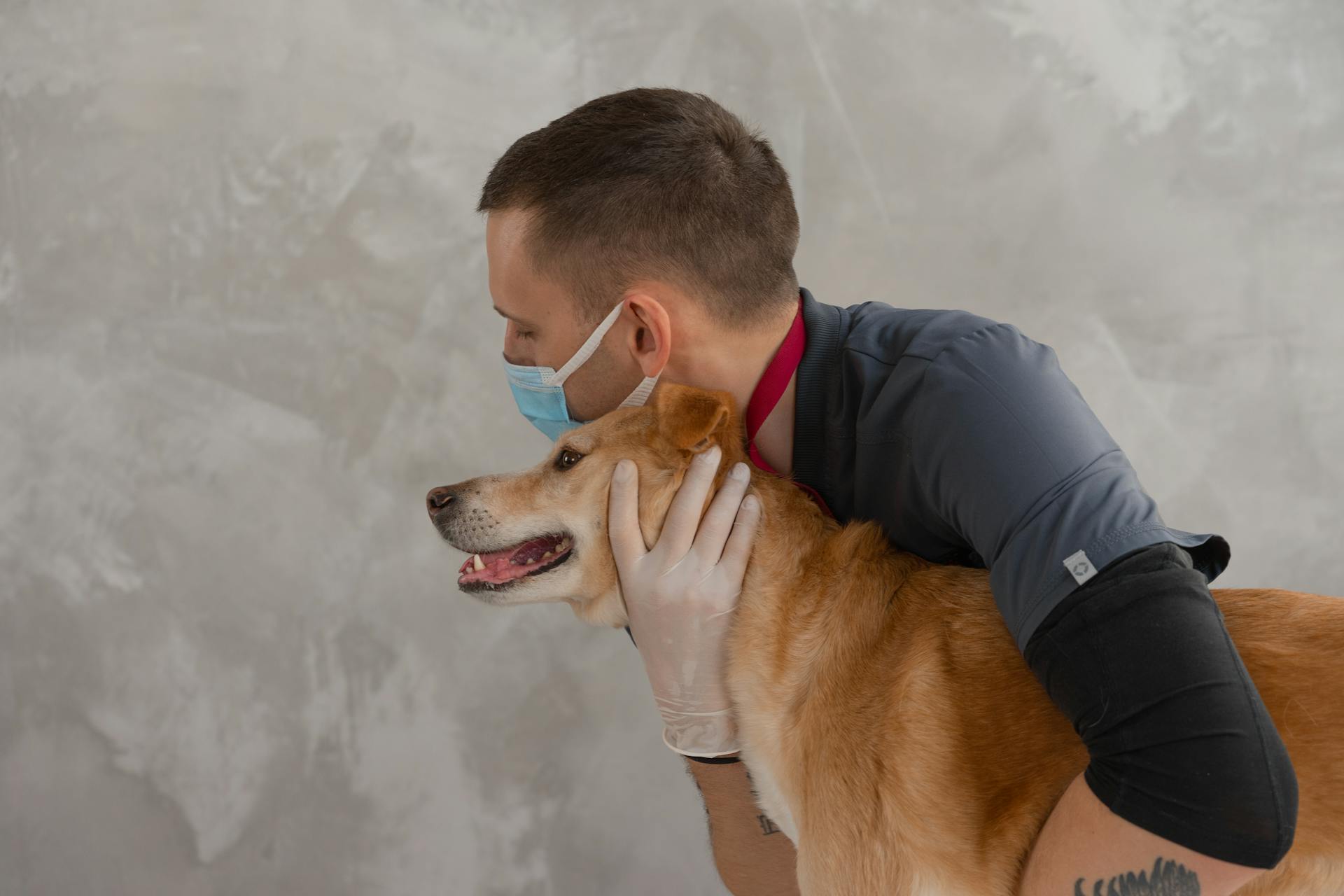
A large volume or liquid squirts of loose stool are common symptoms of diarrhea. This can be uncontrolled, making it essential to keep a close eye on your dog's stool output.
The stool color is often darker or lighter than usual, and the odor is stronger and more unpleasant. This can be an indication of underlying health issues that need to be addressed.
Diarrhea that lasts more than 14 days is considered chronic diarrhea. This type of diarrhea requires more intensive treatment and monitoring to prevent dehydration and other complications.
Canine Treatment Options
Treating canine diarrhea requires a multi-faceted approach that addresses the underlying cause and provides relief from symptoms.
Your veterinarian may recommend a bland diet of boiled chicken or other lean meat with rice to help calm the digestive system. Dietary changes can also involve a prescription diet formulated for gastrointestinal issues.
Fluid therapy may be necessary to replace lost fluid and correct electrolyte imbalances in moderate to severe diarrhea cases.
Antibiotics can be prescribed to clear up or prevent a bacterial infection, while anti-parasitics may be necessary if your dog has intestinal parasites.
A monoclonal antibody treatment is available for puppies with parvovirus, and probiotics can help restore gut balance by promoting the growth of good bacteria in the colon.
Some common ingredients in dog diarrhea treatments include kaolin and pectin, which help absorb and remove bacterial toxins, and detoxify, coat, and soothe gastrointestinal membranes.
Over-the-counter dog diarrhea treatments come in various forms, such as liquid, chewable, paste, and powder, and can be ordered online for quick delivery. These treatments can provide fast relief from mild digestive problems like vomiting, diarrhea, and gas.
Here are some common medications used to treat dog diarrhea:
It's essential to consult with your veterinarian before administering any medication, especially loperamide, which can cause serious side effects in some breeds.
Frequently Asked Questions
What is the best thing to give a dog with diarrhea?
For a dog with diarrhea, try a bland diet of plain-cooked white rice with chicken and canned pumpkin for 24-48 hours to help soothe their stomach. Gradually reintroducing regular food once symptoms improve can help your pup feel better.
Can I give my dog Pepto Bismol for his diarrhea?
Consult your veterinarian before giving your dog Pepto-Bismol for diarrhea, as it's not suitable for every dog and chronic use is not recommended
How fast does metronidazole stop diarrhea in dogs?
Metronidazole typically starts working within 1-2 hours, with noticeable improvements in diarrhea symptoms usually seen after a few days.
Featured Images: pexels.com
